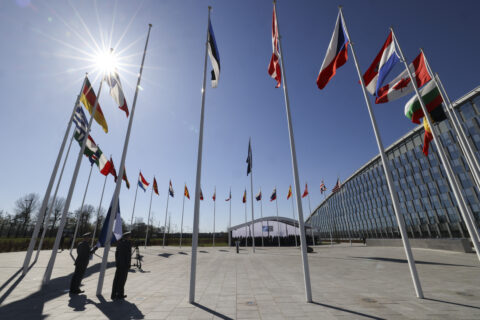There’s a major war in continental Europe that might further embroil the NATO alliance in hot combat, so it’s the perfect time for … pulling the US military out of Europe and letting the European NATO allies handle their own defence needs, right?

“Finland flag raising at NATO Headquarters 4 April 2023” by UK Government Picture by Rory Arnold / No 10 Downing Street is licensed under CC BY 2.0 .
For decades, U.S. policy toward Europe stayed the same: Washington anchored itself to the continent via NATO and acted as the region’s main security provider while the European members of NATO accepted U.S. leadership. Today, however, much of the Republican Party has departed from this consensus, opting instead for a policy summed up by Donald Trump’s comments on “delinquent” NATO countries: “If they’re not going to pay, we’re not going to protect.” In other words, the United States may remain committed to Europe, but only if European states pay up. Democrats, for their part, have dug in deeper in response to this shift. President Joe Biden has affirmed the “sacred” Democratic commitment to European defense and trumpeted the admission of Finland and Sweden to NATO as a great achievement of his administration. Kamala Harris has signaled no departure from Biden’s position as the presumptive Democratic presidential nominee.
A debate about the U.S. role in Europe is long overdue, but both sides have wrongly defined the issues and interests at play. In fact, the United States has the same cardinal interest in Europe today that it has had since at least the early 1900s: keeping the continent’s economic and military power divided. In practice, pursuing this goal has meant preventing the emergence of a European hegemon. Unlike the continent in the mid-twentieth century, however, Europe today lacks a candidate for hegemony and, thanks in part to the success of U.S. efforts after 1945 to rebuild and restore prosperity to Western Europe, another hegemonic threat is unlikely to emerge.
The United States should recognize that it has achieved its main goal in Europe. Having successfully ensured that no country can dominate the continent, it should embrace a new approach to the region. Under a revised strategy, the United States would reduce its military presence on the continent, Europeanize NATO, and hand principal responsibility for European security back to its rightful owners: the Europeans.
A Fine Balance
For more than 100 years, the United States has had one enduring national interest in Europe: keeping the continent’s economic and military power split among multiple states by preventing the emergence of a European hegemon that sought to consolidate that power for itself.
In World War I and World War II, Washington went to war to stop Germany from dominating Europe. NATO, founded in 1949, was designed to foreclose the possibility that a single country could take over the continent. As Secretary of State Dean Acheson remarked that year, the two world wars “taught us that the control of Europe by a single aggressive, unfriendly power would constitute an intolerable threat to the national security of the United States.”
U.S. support for NATO was a reasonable move at a time when the Soviet Union was threatening to overrun the continent, wartime memories were fresh, and Germany’s future was unclear. Yet even back then, Washington’s goal was not to take permanent responsibility for European security. Instead, NATO was intended as a temporary expedient to protect Western European states as they recovered from World War II, facilitate Western European efforts to balance Soviet power, and integrate West Germany into a counter-Soviet coalition that would also help civilize German power. In 1951, as the supreme Allied commander in Europe, Dwight Eisenhower noted, “If in ten years, all American troops stationed in Europe for national defense purposes have not been returned to the United States, then this whole project will have failed.”
To that end, Presidents Harry Truman and Eisenhower tried to pull together a “Third Force” of European power by encouraging France, the United Kingdom, West Germany, and other Western European states to combine their political, economic, and military resources against the Soviet Union. Once formed, this Third Force would relieve the United States of the duty to serve as Europe’s first line of defense. Only as it became clear in the late 1950s and early 1960s that Western European states worried as much about Germany as they worried about the Soviet Union did the United States reluctantly accept a more enduring role in the alliance.



